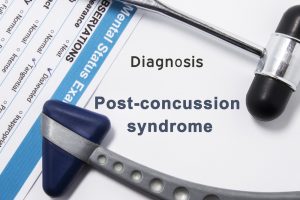 Post-concussion or post-concussive syndrome is typically associated with a head injury. It refers to the lingering symptoms of a concussion or a mild traumatic brain injury. While post-concussive syndrome is rare after only one concussion, it is common in patients who have a history of multiple concussions or mild head injuries.
Post-concussion or post-concussive syndrome is typically associated with a head injury. It refers to the lingering symptoms of a concussion or a mild traumatic brain injury. While post-concussive syndrome is rare after only one concussion, it is common in patients who have a history of multiple concussions or mild head injuries.
Usually, symptoms of a concussion last only for a couple of weeks. If the symptoms do not seem to be getting better and persist for a duration longer than normal, you should consult your doctor about post-concussive syndrome.
What Are the Symptoms of Post-Concussion Syndrome?
The symptoms of post-concussive syndrome vary from person to person. They are often vague and non-specific. Some commonly reported symptoms include –
- Headaches
- Dizziness
- Anxiety
- Irritability
- Fatigue
- Insomnia
- Ringing in the Ears
- Loss of Concentration and Memory
- Blurry Vision
- Noise and Light Sensitivity
- Decrease in Taste and Smell
- Depressed Mood
- Concentration Problems
- Personality Changes
What Are the Causes of Post-Concussion Symptoms?
Post-concussion syndrome follows the occurrence of an injury or trauma to the head. Research suggests that the cause of post-concussion symptoms is related to the damage to the white matter in the brain. White matter can be described as the tissue in the brain that comprises of nerve fibers. Damage to this tissue hampers pathways between the brain and the rest of the body.
Some experts believe that post-concussive syndrome is caused by structural damage to the brain. Due to the impact of the concussion on the brain, the messaging system within the nerves gets disrupted. On the other hand, some experts believe that the syndrome is related to psychological factors. This is attributed to the fact that most common symptoms, such as headaches, insomnia and dizziness, are similar to those experienced by people who are often diagnosed with anxiety, depression or post-traumatic stress disorder.
It is still not determined as to why some people who have had concussions develop persistent post-concussion symptoms while others do not. In addition to this, there is no proof to suggest that there is a connection between the severity of the injury and the likelihood of developing persistent post-concussion symptoms.
Some research shows that people who have a history of depression, anxiety, post-traumatic stress disorder, poor social support systems, significant life stressors or lack of coping skills have a higher chance of developing post-concussive syndrome in comparison to those who do not.
There are also certain risk factors for developing a post-concussive syndrome. Studies prove that increasing age is a risk factor. In addition to this, women, too, are more likely to be diagnosed with post-concussive syndrome than men. Athletes and military servants are also more at risk for post-concussive syndrome as they have a higher risk of sustaining a concussion or a brain injury.



